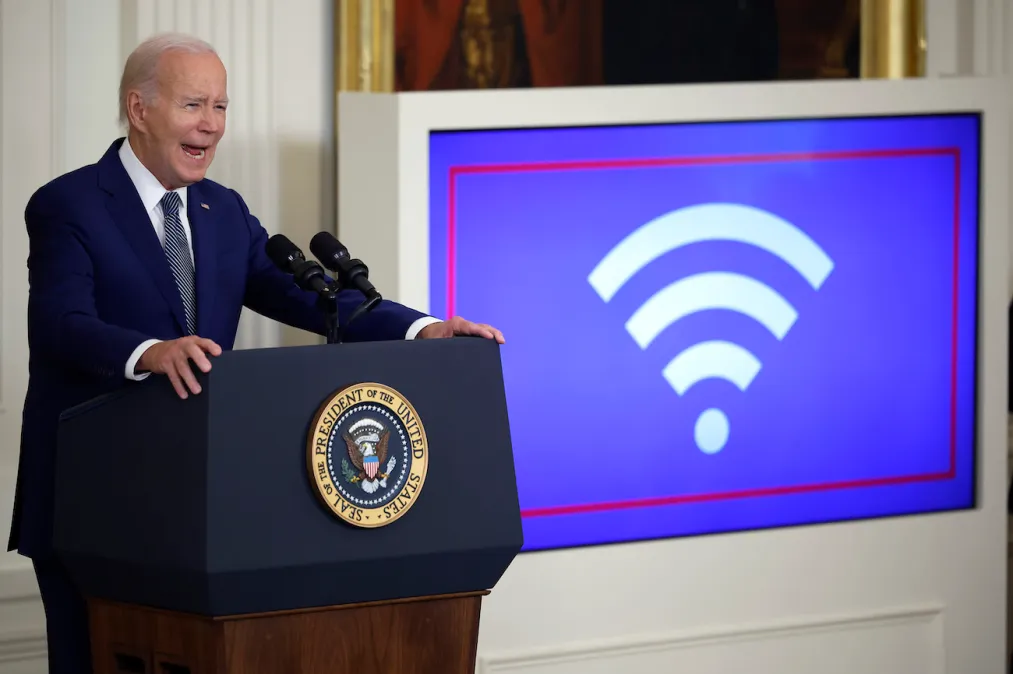Biden administration asks Republicans to extend popular broadband discount program

President Joe Biden’s administration on Tuesday called on Republicans in Congress to extend funding for the Federal Communications Commission’s Affordable Connectivity Program, a consumer broadband rebate program used by more than 23 million households.
Members of Congress in January introduced bipartisan legislation that would add a $7 billion extension to the Affordable Connectivity Program. Without an extension, it’s expected to run out of funding this month.
“In the 21st Century, affordable, reliable, high-speed internet is essential,” Stephen Benjamin, a Biden senior adviser, said during a press call Monday. “High-speed internet is necessary for Americans to participate in school, do their jobs, access health care and stay connected to loved ones, yet millions of Americans can’t afford the cost of their monthly internet connection if they have access to the internet at all.”
The the $14.2 billion Affordable Connectivity Program was signed into law in November 2021 and began accepting enrollments at the end of that year. The FCC is now winding down the program and said that though April will be the last month recipients will receive full benefits, ACP households may receive some percentage of their usual discounts in May.
Benjamin said that nearly half of the 23 million households enrolled in program are military families and about a quarter are seniors. He also noted that communities of color and rural residents will be disproportionately impacted by the program’s ending.
Apparently no action has been taken on the legislation since it was introduced in January by Sen. Peter Welch, D-Vt., and referred to the Senate Appropriations Committee. Federal officials on a press call did not specify what congressional Republicans were doing to stall the legislation, but Jon Donenberg, deputy director of the White House’s National Economic Council, said that continuing the program has garnered more interest from Democrats.
“We have not seen that interest from Republican leaders in Congress,” Donenberg said. “Ultimately, we need both sides to come together on this and get it done for their constituents. Otherwise, it’s not going to happen.”
Since October, Biden has been calling on Congress to pass legislation that would extend ACP through the end of 2024. He also included funding for the program in his 2025 budget request.
FCC Chair Jessica Rosenworcel wrote of the “urgent need” to continue the program in a letter dated Tuesday addressed to Sen. Maria Cantwell, D-Wash., chair of the committee on commerce, science and transportation. Rosenworcel added that the FCC established the program in “record time” when originally asked by Congress.
“The result has been the most consequential broadband affordability effort in our history,” Rosenworcel wrote. “I want you to know that the agency remains ready to keep this program running, should Congress provide additional funding. We have come too far to allow this successful effort to promote internet access for all to end.”
ACP enrollment count by household:
Alaska: 27,784
Alabama: 413,668
Arkansas: 215,017
Arizona: 522,188
California: 2,945,282
Colorado: 251,506
Connecticut: 186,531
Delaware: 52,446
Florida: 1,707,856
Georgia: 722,473
Hawaii: 60,721
Iowa: 124,054
Idaho: 53,962
Illinois: 704,532
Indiana: 425,968
Kansas: 133,746
Kentucky: 455,685
Louisiana: 558,780
Massachusetts: 367,884
Maryland: 287,722
Maine: 98,639
Michigan: 941,244
Minnesota: 244,916
Missouri: 395,504
Mississippi: 244,280
Montana: 54,539
North Carolina: 901,394
North Dakota: 17,742
Nebraska: 96,140
New Hampshire: 38,859
New Jersey: 337,969
New Mexico: 184,131
Nevada: 276,024
New York: 1,792,187
Ohio: 1,157,054
Oklahoma: 351,879
Oregon: 238,974
Pennsylvania: 763,742
Rhode Island: 83,516
South Carolina: 415,680
South Dakota: 24,194
Tennessee: 429,621
Texas: 1,718,552
Utah: 75,088
Virginia: 470,457
Vermont: 25,923
Washington: 358,024
Wisconsin: 426,733
West Virginia: 128,571
Wyoming: 21,73
American Samoa: 1,685
District of Columbia: 186,531
Guam: 1,322
Northern Mariana Islands: 3,218
Puerto Rico: 644,623
Virgin Islands: 6,780






